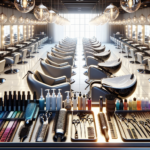Understanding the Unique Needs of Senior Clients
When it comes to hair care, seniors have distinct needs that require special attention. As people age, their hair often undergoes changes such as thinning, graying, and increased sensitivity. Hairdressers catering to seniors must be aware of these changes to provide appropriate care. This involves choosing products that are gentle on the scalp and hair, as well as using techniques that minimize discomfort.
One crucial aspect is understanding the physical limitations some seniors may face. This includes mobility issues that make it difficult for them to sit for extended periods or move easily between washing stations and styling chairs. Hairdressers should be prepared to offer adjustable seating and be willing to accommodate clients’ needs by providing breaks or offering services that can be performed while the client remains seated comfortably.
Moreover, communication plays a vital role in ensuring seniors feel heard and valued. Hairdressers should take the time to listen to their clients’ preferences and concerns, offering advice that respects their wishes while ensuring the health of their hair. By fostering a supportive and understanding environment, hairdressers can build trust and rapport with their senior clients.
Creating a Comfortable and Accessible Salon Environment
The ambiance of a salon is essential in making senior clients feel welcome and comfortable. A salon catering to seniors should prioritize accessibility, ensuring that the space is easy to navigate for those with mobility aids such as walkers or wheelchairs. This might involve wider aisles, ramps, and accessible restrooms.
In addition to physical accessibility, the atmosphere should be calming and inviting. Soft lighting, comfortable seating, and a warm color palette can contribute to a relaxing environment. Some salons might also offer refreshments or reading materials to enhance the experience.
Staff training is another important factor in creating a positive environment for seniors. Hairdressers and support staff should be trained in senior care, including how to assist clients with mobility issues or sensory sensitivities. This training can help staff anticipate and meet the needs of their senior clients effectively, ensuring a pleasant experience for everyone.
- Ensure salon is wheelchair accessible with ramps and wide aisles.
- Provide comfortable seating with options for breaks during longer appointments.
- Train staff in senior care and communication techniques.
Personalized Hair Care Solutions for Seniors
Personalization is key when it comes to hair care for seniors. Each client has unique preferences and requirements, and hairdressers should be prepared to offer tailored solutions. This might include custom haircuts that account for thinning hair or styles that are easy to maintain at home.
Coloring services for seniors also require a personalized approach. Many older adults prefer to embrace their natural gray, while others might choose to enhance or alter their color. Hairdressers should use gentle, ammonia-free products that are less likely to irritate sensitive scalps.
For seniors who may have difficulty styling their hair daily, hairdressers can offer tips and techniques for simple yet effective styling. This might include product recommendations that add volume or texture without requiring extensive effort. Additionally, some salons offer workshops or one-on-one sessions to teach seniors how to care for their hair between appointments.
- Offer haircuts that are easy to maintain and suit thinning hair.
- Use gentle, ammonia-free coloring products.
- Provide styling tips and workshops for at-home care.








